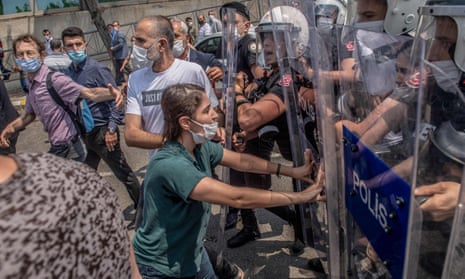After a five-day journey across the country, a “march for justice and democracy” by Turkey’s People’s Democratic party (HDP) culminated in a rally next to the parliament building in Ankara on Saturday. The pro-Kurdish opposition party’s trip was not a smooth one: many demonstrators faced police, teargas and arrests.
“I took part in the march in a few towns,” said Garo Paylan, the HDP MP for Diyarbakır, a Kurdish-majority city in Turkey’s south-east. “The level of force on show was worse than ever: soldiers, police, helicopters, guns everywhere. We try to walk in peace but the state doesn’t even allow that. Courage is very hard under these circumstances.”
This time last year, Turkey’s opposition was celebrating a landmark victory after voters in Istanbul rejected an attempt by the president, Recep Tayyip Erdoğan, to overturn the outcome of the mayoral election. Together with opposition wins in Ankara, Antalya and Mersin, the results proved that even after 16 years, the president’s grip on the country was not final.
The local election successes were possible because, for the first time, the disparate nationalist, liberal and pro-minority elements of Turkey’s political opposition managed to work together effectively. Twelve months on, however, that solidarity appears to be failing – and the HDP is bearing the brunt of an ever-escalating government crackdown.

The HDP, formed out of an alliance of leftists and Kurdish nationalists in 2012, is often compared to Green party movements and European democratic socialist parties such as Podemos in Spain and Syriza in Greece. A less favourable parallel is drawn with Sinn Féin, because of its historical association with the outlawed militant Kurdistan Workers’ party (PKK).
At a teahouse in Istanbul’s working-class Tarlabaşı neighbourhood on Tuesday, neighbours talked in worried tones as they discussed recent moves to neuter bar associations and social media threats made against Başak Demirtaş, the wife of the imprisoned HDP leader, Selahattin Demirtaş.
With 45 mayors out of the 65 municipalities that HDP won last year already removed from office or arrested over alleged terrorism links, many feel that support for the HDP from the main liberal opposition party, the Republican People’s party (CHP), is lacking.
“We had hope in last year’s mayoral elections, we came together to support [Istanbul CHP candidate Ekrem İmamoğlu] against the government,” said 30-year-old Mazlum, a HDP voter originally from Diyarbakır.
“We warned the CHP that after they’re done oppressing us it will be them next. If they don’t speak up for us then they are part of the problem.”

The HDP delivered a searing blow to Erdoğan’s Justice and Development party (AKP) in Turkey’s 2015 national election, destroying the ruling party’s majority by breaking through the 10% election threshold that has traditionally kept small parties and Kurdish politicians out of parliament.
To undo its victory, the government pulled out of peace talks with the PKK, plunging Turkey’s Kurdish south-east into renewed violence, and began arresting HDP politicians and supporters over alleged links to the militant group. When the election was rerun later that year, it yielded a much more favourable result for the AKP.
The party has struggled to maintain momentum in Turkey’s increasingly hostile political and media environment. Rather than ban it altogether, however, Erdoğan has realised that keeping it inside the legitimate political spectrum can help him exploit the differences between Turkey’s diverse opposition groups, scuppering their attempts at a united front. A cross-border offensive against Syrian affiliates of the PKK in October 2019, for example, was supported by the CHP, infuriating HDP MPs who voted against it.
“We are at a critical turning point in Turkey. All the opposition must meet on common ground to form a democratic alliance against one-man rule,” said Filiz Kerestecioğlu, an Istanbul HDP representative. “We must not fall into the dividing and isolating traps set by the ruling party.”
Despite the often great personal risk, HDP’s members remain determined to fight for leftwing causes in Turkey. There is also hope that CHP is getting better at attracting voters outside its base: the Ankara mayor, Mansur Yavaş, and Istanbul’s mayor, Ekrem İmamoğlu, have both surged in popularity over their handling of the Covid-19 crisis. According to the analyst Selim Koru, the party’s youth wings are more class-conscious and less enamoured with nationalism than their forebears, giving them more in common with the Turkish left.
Most crucially, Turkey’s protracted economic downturn continues to erode Erdoğan’s popular support. Even after five years of a crackdown against the HDP, a survey by Metropoll this month found that if snap elections were called, the party would once again emerge as parliamentary kingmakers.
Turkey is not supposed to hold national elections for another three years, which is a long time in such a politically turbulent country. While it is likely the AKP will try to rewrite electoral laws in order to keep out newly formed rightwing parties, the government coalition’s ever-thinning margins mean almost anything could happen.
“Despite Erdoğan’s dominance, Turkey’s democratic tradition is still strong,” said Soner Çağaptay, the director of the Turkish research programme at the Washington Institute for Near East Policy.
“It may not be a level playing field any more but the opposition is vigilant. They’re not going anywhere.”
